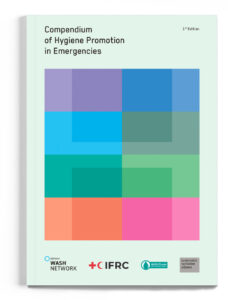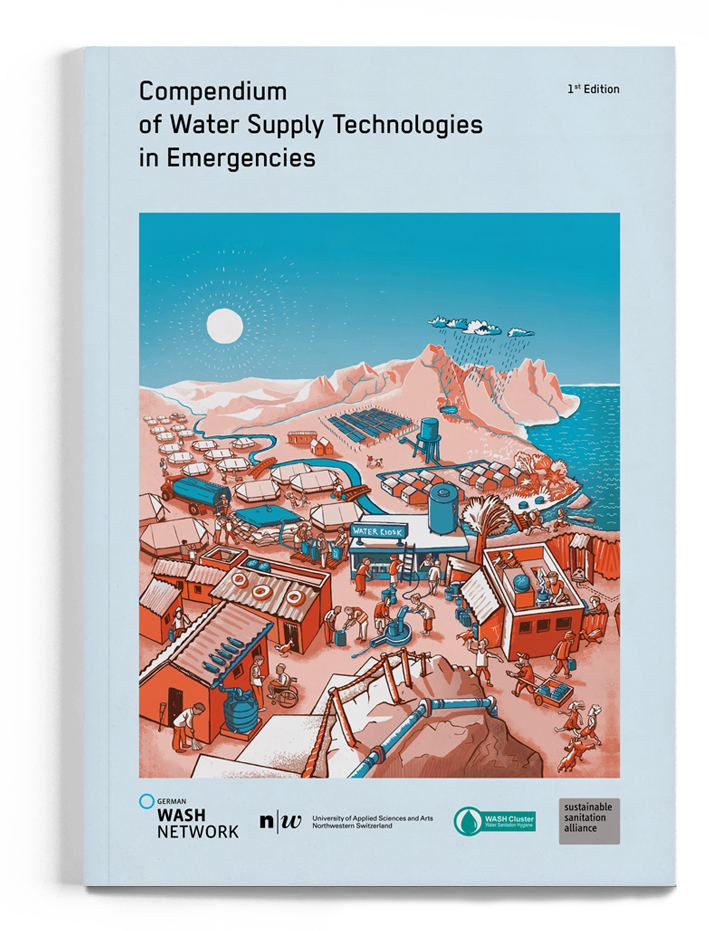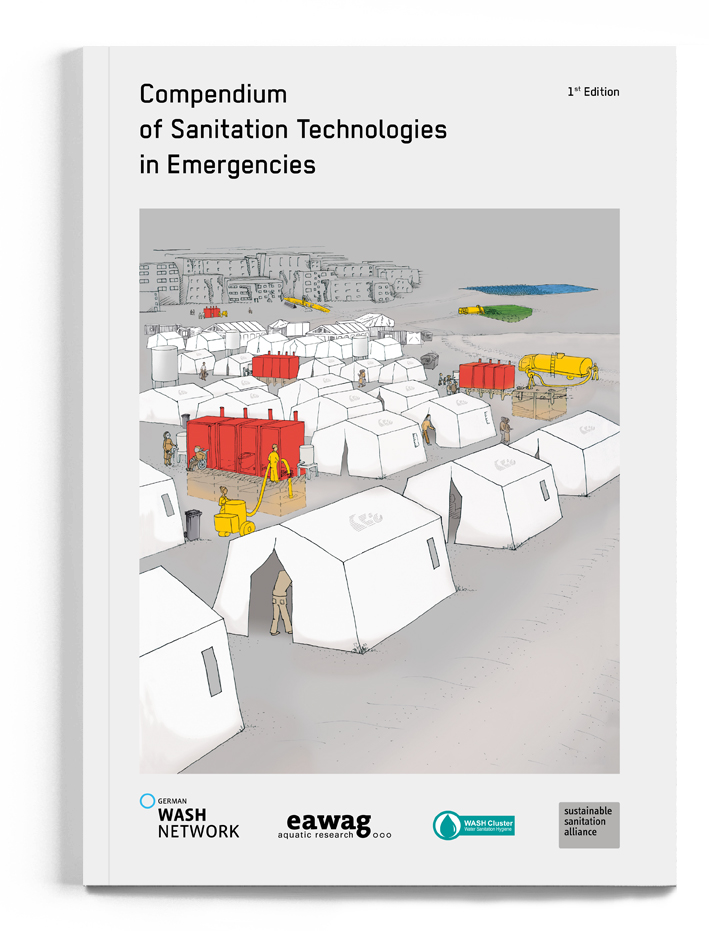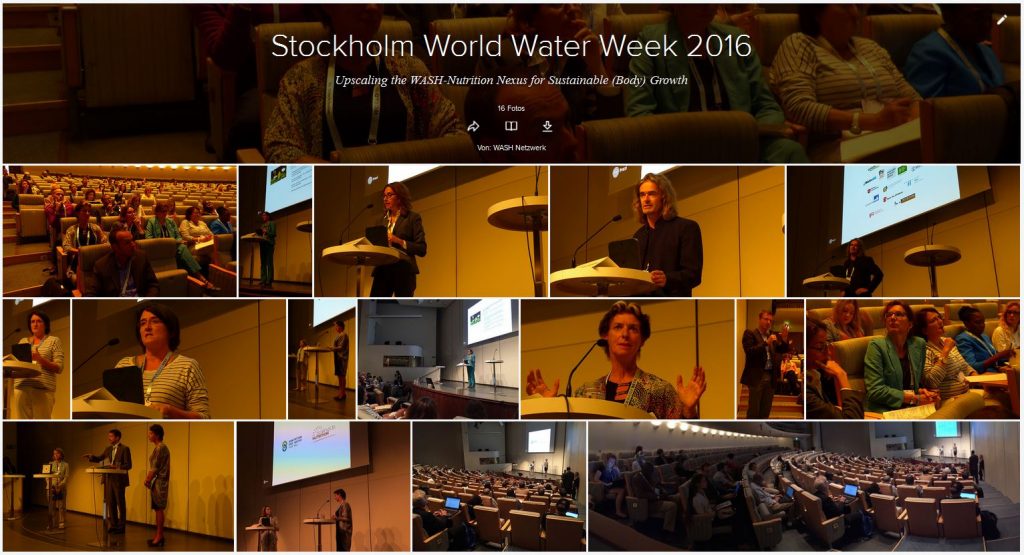Stockholm Weltwasserwoche 2016

Seminar: Upscaling the WASH-Nutrition Nexus for Sustainable (Body) Growth
In den vergangenen Jahren gewinnt die bislang vernachlässigte Verbindung zwischen WASH und Ernährung zunehmend an Bedeutung. Es ist erwiesen, dass die körperliche und kognitive Entwicklung des Einzelnen durch unzureichendes WASH gehemmt werden und so einer nachhaltigen gesellschaftlichen und wirtschaftlichen Entwicklung entgegenstehen.
Wesentliche Fortschritte finden auf beiden Seiten statt:
Auf der Ernährungsseite schreitet die Entwicklung politisch voran: Eine Reihe von Ländern hat WASH-Komponenten in ihre nationalen Ernährungsstrategien integriert.
Auf der WASH-Seite werden Fortschritte insbesondere auf der operationellen Ebene vorangetrieben: Organisationen entwickeln ready-to-apply „ergänzende Pakete“ in ihren Programmen.
Der Dialog sollte auch langfristig erfolgen, damit Initiativen auf beiden Seiten bestmöglich ineinandergreifen um somit ein erfolgreiches Upscaling zu gewährleisten.
Das Seminar baut auf den Ergebnissen des Bonn WASH Nutrition Forum 2015 (WNF) auf und hat den Anspruch, auch eine Reihe von Schlüsselakteuren aus dem Bereich Ernährung zum ersten Mal nach Stockholm zu bringen. Ihre Präsentationen erlauben WASH-Experten in Stockholm politisch relevante und spezifische operationelle WASH-Lösungen zu entwerfen, fit-for-purpose um zu verbesserten Ernährung-Outcomes beizutragen.
Eines der ehrgeizigen Ziele des WNF ist es, die Anzahl jener Länder zu verdoppeln, die WASH in ihre Ernährungspläne integrieren. Das Seminar wird Anreize identifizieren dieses umsetzbar zu machen und setzt sich für einen übergeordneten Rahmen der Sektorintegration im Kontext der SDGs ein, wobei die globalen Plattformen SWA Partnership und SUN Movement eine tragende Rolle spielen sollen.
Begrüßung, Einleitung und Thematische Einführung
- Thilo Panzerbieter, WASH Netzwerk
- Living the WASH-Health-Nutrition Nexus in the Spirit of the SDG Agenda, Dr. Heike Henn, BMZ
News from the Nexus
- WASH in the Global Nutrition Report 2016, Patrizia Fracassi, Global Nutrition Report
- The WASH´Nutrition Operational Manual, Dr. Jean Lapegue, Senior WASH Advisor, ACF
- The Missing Ingredients- Nutrition Plan Analysis Index, Dan Jones, Advocacy Coordinator, WaterAid
- WASH considerations for the update of the Infant Feeding in Emergencies Operational Guidance,
Emily Mates, Emergency Nutrition Network
How do Global Platforms Make the Link?
- Catarina de Albuquerque, Vorsitzende, Sanitation and Water for All Partnership
- Gerda Verburg, Koordinatorin Scaling Up Nutrition Movement
Finale Diskussion und Abschluss
- Dialog mit dem Publikum
- Thilo Panzerbieter, Vorsitzender German WASH Network
Die Konklusion der Session ist nur in Englisch verfügbar
Documentation
The seminar focused on the link between WASH and Nutrition and brought various stakeholders together. Particularly the engagement of nutrition experts in this WASH-focused conference was a success. Apart from the global platforms Scaling Up Nutrition (SUN) Movement and Sanitation and Water for All (SWA) Partnership, country representatives, research institutions, the private sector, civil society organisations as well as the Global WASH and the Global Nutrition Cluster coordinators engaged in a dialogue.
The film “Sanitation and Nutrition: Let’s Break the Vicious Cycle!” by Generation Nutrition, served as a thematic introduction: https://www.youtube.com/watch?v=yWIr-eJ8FAs
Dr. Heike Henn from BMZ highlighted that in the context of the SDGs, everyone is challenged to think outside their box. BMZ’s special initiative “One World No Hunger” integrates WASH and is thereby one of Germany’s contributions to making such links.
Key Points by Dr. Heike Henn (BMZ)
- The SDGs challenge us to think outside the box.
- We need to share good practices and evidence amongst each other.
- Evidence of greater returns of integrated WASH and Nutrition investments can help.
- The First 1,000 Days is one important window of opportunity for collaborations.
- We need to understand better when to include each other at each stage of the program cycle.
- Leaving one’s own comfort zone is essential for making the link.
In the last year, a number of WASH-Nutrition publications have been published and new tools were developed – more are still in the making: Patrizia Fracassi (Global Nutrition Report, SUN) introduced the integrated chapter of the Global Nutrition Report 2016 and urged governments and decision-makers to spend money in a more effective way. With expertise in implementation, Jean Lapègue (ACF) announced the upcoming WASH’Nutrition Operational Manual, a guidance document for practitioners on how integration can be achieved at different levels. Dan Jones (WaterAid) presented a new tool that analyses national nutrition and WASH plans for their degree of integration. Emily Mates (ENN) introduced policy guidance being provided on Infant and Young Child Feeding in Emergencies, including WASH considerations.
At the global level, Gerda Verburg (SUN) and Catarina de Albuquerque (SWA) engaged in an open dialogue and agreed that the global platforms can play a vital role in shaping the WASH-Nutrition landscape.
Key Points by Gerda Verburg (SUN)
- SDGs are not business as usual, but call for inter-sectoral collaboration at all levels: community level, CSO, UN, governmental etc.
- We need measurable impact that can be shown and scaled up.
- Ownership, accountability and credibility are needed – Ministers have to act in a credible way.
- We do not need to wait until 100% evidence is there, but start working with what we have: Working at field level, we can make progress, generate evidence and share lessons.
- Good examples exist: According the WaterAid analysis, Nepal has done an excellent job of aligning WASH & Nutrition strategies.
- Recommendations for the near future:
- NGOs to have a smart combination of advocacy and commitments to implementation, advocacy can support implementation and the other way around.
- Governments to think about their system of subsidising organisations, to build incentives that stimulate breaking the silos and to think about how they finance research: build incentives to implement the findings at grassroots level to make research available on the ground to make them scalable and replicable.
- Businesses to not only focus on profit maximisation. It is necessary to broaden their leadership, to think about the interest and health of consumers and serving society, the climate, planet and environment.
- Data collection for SDGs needs to be inclusive in order to avoid new silos of data coming from different actors.
Key Points by Catarina de Albuquerque (SWA)
- A central aspect of the SDGs is the elimination of inequalities, integrated approaches are essential.
- Accountability is also a fundamental principle of SDGs.
- SDG 6 is more comprehensive – it has not been met by any country in the world. It therefore makes sense also for “developed” countries to join both, SWA and SUN.
- Action is needed to make a difference at country level:
- Collaboration amongst sector agencies, governmental agencies, multilateral, bilateral, CSO, etc.: Silos must be broken at all these different levels.
- SWA convenes High Level meetings of Ministers of Finance and sectors, commitments are then monitored by SWA. Good examples of integration exist in Ivory Coast and Laos.
- SWA has developed “collaborative behaviours” (enhancing government leadership, strengthening country systems, generating reliable data and mutual accountability and building sustainable financing strategies) and considers multi-stakeholder planning exercises as great opportunities to discuss with the nutrition sector.
- Financial issues are important as they are among the key incentives for government action.
- It is vital to improve core systems, the enabling environment: Every country needs good plans and systems for planning and financial management. Good systems that serve nutrition will serve WASH and vice versa.
Discussion
Governments
Peter Mahal, Representative from the Ministry of Water from South Soudan
South Sudan is part of both SWA and SUN. The challenge is that each sector is looking for funding for its own departments. There is a need to strengthen coordination mechanisms at the country level.
Civil Society Organisations
Vishwanath, Founder of Biome Environmental Solutions and independent journalist
He recalled that both sectors have common underlying problems and stressed the need for women empowerment and education to make integration sustainable.
Frank Grives, WASH Advisor, Tearfund
He raised the question of what should be done differently from a WASH practitioner’s point of view – guidelines such as the ACF’s operational Manual are going to fill a gap.
Serge Breysse, Director for Advocacy and Research, ACF
ACF is undertaking research at field level in Chad that illustrates the link between recovery and nutritional status and access to WASH at household level.
UN and Multinational Organisations
Josephine Ippe, Coordinator, Global Nutrition Cluster
It is important to recall the number of populations affected by humanitarian crisis with critical WASH and nutritional needs. She raised the question of how we can realise the integration in non-state contexts and how the linkages also between humanitarian and development can be ensured.
Uschi Eid, former Chair of UNSGAB
She called on both movements to join forces to influence the international agenda and take forward recommendations from UNSGAB. She stressed that WHO should acknowledge sanitation as preventive medicine – sanitation and health need to go hand in hand.
Bruce Gordon, WHO
It is not about “we should”, it is about “we need” to collaborate for a sustainable impact. There are opportunities for integration during the planning process at the country level, e.g. targeting of vulnerable populations with high open defecation and high stunting prevalence.
Susana Sandros, former UNICEF Mauritania WASH & Nutrition
We need to have more evidence in order to be able to advocate stronger for the WASH-Nutrition linkage.
Private Sector
David Boys, former UNSGAB member, Deputy General Secretary of the Global Trade Union Federation Public Services International (PSI)
He raised the question about the role of the private sector and how to make their responsibility core business and not Corporate Social Responsibility (CSR). He also highlights the ambivalence of governments in handling large nutrition equities, who partly fund nutrition activities, but are part of the problem.
Sanjay Banka, Member of SWA in representation of the private sector
He mentioned a positive case of nutrition and WASH integration and CSR of mid-day meals and toilets in schools in India.
Response / Final Remarks
Catarina de Albuquerque (SWA)
Non-government contexts: In non-government contexts, SUN, SWA and other multi-stakeholder platforms play an important role as they can raise awareness within the diverse network of partners. Private sector engagement: Adequate preconditions need to be in place to ensure that PPPs do not go against the rights of vulnerable populations, thus it is about strengthening country systems.
Gerda Verburg (SUN)
Private sector engagement: Working together for SDGs is not CSR. Apart from the Civil Society, Donor and UN Network, SUN has a Business Network to engage the private sector. Members have to behave according to 10 SUN principles.
Self-reflection: Self-reflection is essential as organization and also as multi-stakeholder platform: Are we doing the right things? And are we doing the things right?
The discussion continued at the SuSanA „WASH & Nutrition“ Working Group Meeting. Please find results here: http://forum.susana.org/forum/categories/92-nutrition-and-wash-including-stunted-growth/18479-wash-a-nutrition-events-at-the-stockholm-world-water-week-2016
Links
Offizielle Homepage der Weltwasserwoche
Werde WASH-Netzwerk Fan auf Facebook
Hier finden Sie das Seminar im offiziellen Programm der Weltwasserwoche
Veranstalter des Seminars
WASH Network
Bundesministerium für wirtschaftliche Zusammenarbeit und Entwicklung (BMZ)
Action contre la faim (ACF)
Deutsche Gesellschaft für Internationale Zusammenarbeit (GIZ)
End Water Poverty (EWP)
Emergency Nutrition Network (ENN)
Generation Nutrition (GN)
Sanitation and Water for All Partnership (SWA)
Scaling Up Nutrition Movement (SUN)
Sustainable Sanitation Alliance (SuSanA)
WaterAid
World Health Organization (WHO)
Eingeladene ExpertInnen und RednerInnen
Thilo Panzerbieter, German Toilet Organization / WASH-Netzwerk
Dr. Heike Henn, Bundesministerium für wirtschaftliche Zusammenarbeit und Entwicklung
Hon. Kevin Rudd, Chair of Sanitation and Water for All Partnership
tbd, Scaling Up Nutrition Movement
Prof. Corinna Hawkes, Co-Chair, Global Nutrition Report, tbc
Dr. Jean Lapegue, Senior WASH Advisor, Action Contre La Faim
Dan Jones, Advocacy Coordinator, WaterAid
Marie McGrath, Co-Director, Emergency Nutrition Network
In Zusammenarbeit mit
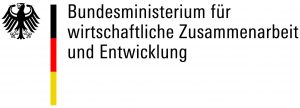
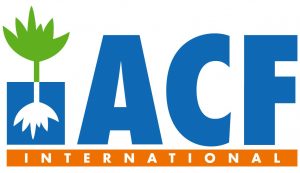

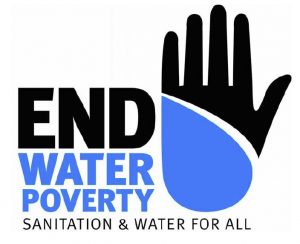


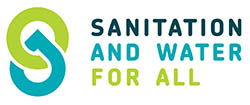
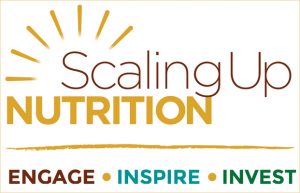



Gefördert durch


